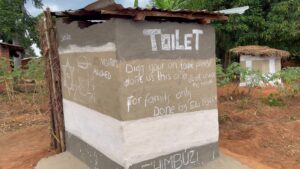- December 13, 2023
- Posted by: Edward Nyirenda
- Category: NRWB Announcements

In the picturesque rural setting of Nkhata Bay on the shores of Lake Malawi, a simple development has changed the lives of villagers in remarkable ways.
As you enter the small village of Headman Imana Kamuning’a, nestled between the lake shore and vast rubber plantations, there is a simple constructed toilet made with locally available materials.
Messages written in chalk ask visitors: “Dig your own toilet please. Don’t use this one. For family only.”
“My son wrote that to constantly remind us of where we are coming from and to not go back there. We were in a pretty-dark place when it came to sanitation and hygiene,” explains Lucy Manda, a mother of three and owner of the toilet.
Villagers in this area of northern Malawi are primarily reliant on fishing and agriculture and live harmoniously with nature. At the same time, basic amenities have long been scarce, with proper sanitation among the most pressing needs. Lacking toilet facilities, the villagers resorted to open defecation, causing health hazards and environmental contamination. Waterborne diseases were rife, particularly among the young and the elderly, and the area became a cholera hotspot.
“We didn’t have a toilet. Me and my family used to defecate in the nearby bushes,” recalls Manda. “During the rainy season, our area was one of the hardest hit by cholera, but we could not connect that we were mostly ourselves to blame. We had created a very unhygienic environment with open defecation until the project came.”
The Northern Region Water Board (NRWB), a water utility operating in the northern part of Malawi, together with the Nkhata Bay District Council, recognised the pressing need for a solution to the challenges communities in Nkhata Bay were facing.
With financial support from the African Development Bank under the Nkhata Bay Town Water Supply and Sanitation Project, the NRWB supported communities to use the Community-led Total Sanitation (CLTS) approach to tackle open defecation and its health-related impacts.
Through the CLTS approach, more than 23,000 community members were reached with sanitation and hygiene promotion messages, which included simple behaviour changes to improve health, says Catherine Mwafulirwa, Director of Infrastructure Development at NRWB.
As toilets began to dot the village, the transformation was tangible. The reduction in open defecation significantly improved overall hygiene, leading to a decline in waterborne diseases. Children are now healthier and attend school more regularly, while adults can concentrate on productive livelihood improvement activities without the constant worry of falling ill.
The construction of these toilets was a game-changer. Made from locally sourced materials like bricks, wood, mud, and thatch, toilet facilities were easy to build and maintain. Each family constructed its own, fostering a sense of ownership and pride.
“We now have proper toilets both in the homes and at school, and this has improved our learning environment unlike in the past when we could not come to school during our menstrual cycle due to lack of proper sanitary facilities,” explains Leah Banda, who attends Kafunda Primary School which serves the village and other nearby communities.
“I am 14 years old and should have been in secondary school but am still in Standard 7 because of this challenge. With the transformation, I hope to properly continue with my education,” she adds.
According to the District Environmental Health Officer for Nkhata Bay, Mathews Kalaya, the intervention has helped address the challenge of waterborne diseases, including cholera. Kalaya explains that owing to the Bank-supported intervention, the areas under Mndola and Mankhambira which were previously cholera hotspots, have had zero cases of cholera in 2023 compared to areas in the same district without CLTS intervention. In 2022, Malawi battled its worst cholera epidemic in recent years; Nkhata Bay District, one of the hotspots, had 1,625 recorded cases and 44 deaths in areas without CLTS interventions.
“Each and every household in the area managed to construct a latrine – with a strong superstructure and roof and impermeable surface with a drop hole cover and hand washing facility. There is no trace of open defecation in the villages, and this is why the areas have attained open defecation free (ODF) status,” explains Kalaya.
Through community-led sanitation interventions, 4,432 improved latrines, up from 1,280, had been constructed by the communities in the target areas by December 2022.
“We are very free and happy people now. Apart from improved sanitation and hygiene, these toilets have improved our dignity and privacy. The simple act of having a safe and private place for personal hygiene has brought about a significant shift in our village’s social dynamics and self-respect,” explains Manda with a smile.
The story of these humble toilets in Nkhata Bay serves as a testament to the power of simple local solutions to uplift the health lives of those in rural areas. It highlights how addressing basic needs can profoundly impact health, education, and the overall quality of life within a community.
“The simple constructed toilets are not just bricks and mortar; they are a symbol of hope and progress bringing about a fundamental change, paving the way for a healthier, more prosperous future for our area. Moreover, the environment has benefited as well. The eradication of open defecation has meant cleaner surroundings and safer water sources, positively impacting agriculture and the ecosystem at large,” says Traditional Authority Mankhambira.
The once-overlooked necessity of a basic toilet has become the catalyst for a healthier, more dignified, and empowered community. Nkhata Bay is slowly becoming a shining example of how simple, well-constructed toilets can pave way for transformative behavioral change in a rural setting.
